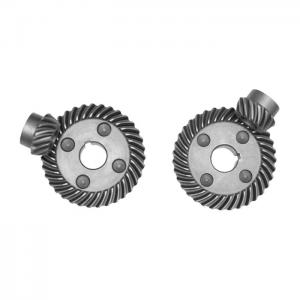Power Tool Gear Hypoid Bevel 90° Axis Intersection Angle Gear For 100 Angle Grinder
Hypoid gears are a specific type of spiral bevel gears that have unique characteristics and are typically used in applications where the axes of the driving and driven shafts are non-intersecting and offset from each other.
In a polishing machine, gears play a crucial role in transmitting power and controlling the rotational motion between the motor and the polishing pad or wheel. Here are the key roles of gears in a polishing machine:
-
Power Transmission: Gears transmit power from the motor to the polishing pad or wheel. The motor generates the rotational motion, and the gears efficiently transfer this motion to the polishing component, allowing it to rotate and perform the polishing action.
-
Speed Control: Gears in a polishing machine enable speed control by adjusting the gear ratio between the motor and the polishing pad or wheel. By changing the gear ratio, the rotational speed of the polishing component can be altered to suit different polishing requirements. This allows for variations in speed depending on the material being polished or the desired finish.
-
Torque Conversion: Gears in a polishing machine also help convert and amplify the torque generated by the motor. The motor may produce a relatively low torque, but the gears increase the torque output, providing the necessary force for effective polishing. This torque conversion allows the machine to exert sufficient pressure on the polishing surface.
-
Direction Control: Some polishing machines have gears that provide direction control, allowing the user to switch between forward and reverse rotation. This feature is useful for achieving specific polishing effects or when working on different surfaces or materials.
-
Mechanical Stability: Gears contribute to the overall mechanical stability of the polishing machine. They help maintain proper alignment, reduce vibration, and ensure smooth operation during the polishing process. Gears provide support and stability to the various components, minimizing any unwanted movement or wobbling.
The 100 angle grinder is the most commonly used one in life and work. It can also be called a compact angle grinder with a diameter of 100 mm. This kind of angle grinder is suitable for cutting and grinding in narrow environments, as well as thin metal materials. It is the most common on the market and has a wide range of functions and uses. Generally, decoration workers on construction sites use this product to cut wood, ceramic tiles and polish, as well as small-scale cutting and polishing of metal objects such as stainless steel and aluminum alloys, cutting, polishing and polishing during stone processing, and many other places. .
| Product |
100 Angle Grinder Gear |
| Drawing Number |
MR19/20 |
| Number of Teeth (Z) |
Z=14/35 |
| Transmission Efficiency |
98.0-99.0 |
| Teeth Accuracy Grade |
ISO 6-7 Grade |
| Module (M) |
≤4 |
| Service |
Customized |
